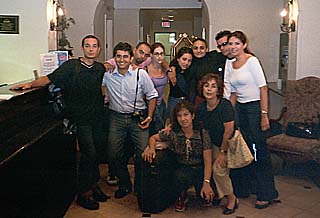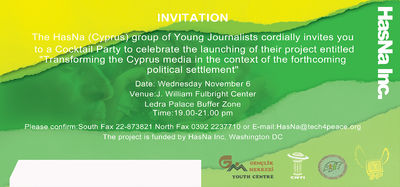Young Journalists Project: Difference between revisions
No edit summary |
No edit summary |
||
| (12 intermediate revisions by 2 users not shown) | |||
| Line 34: | Line 34: | ||
* [[Romina Laouri]], political science student | * [[Romina Laouri]], political science student | ||
==The Cyprus Symposium== | |||
<gallery perrow="3"> | |||
File:Hasna_Journalists_Conf_2005_01.JPG|From lleft Andreas Deliyiannis, Nicos Prokomenos, | |||
File:Hasna_Journalists_Conf_2005_02.JPG|From left Joseph Joseph, Andreas Deliyiannis | |||
</gallery> | |||
==Members of the young journalists== | ==Members of the young journalists== | ||
| Line 55: | Line 62: | ||
==Background and justification of the project== | ==Background and justification of the project== | ||
In 1995, the [[Fulbright Commission]], in collaboration with the [[Cyprus | In 1995, the [[Cyprus Fulbright Commission]], in collaboration with the [[Cyprus Conflict Resolution Trainers Group]], organized and funded a U.S.-based training program for about twenty young journalists from both communities in Cyprus. In 1996, the U.S. Embassy funded a one-day trip to Brussels for prominent chief editors from various Cypriot media organizations, where they received up-to-date information regarding EU regulations, challenges and opportunities in the field of journalism. While both of these projects helped to form linkages and friendships between colleagues working across the Green Line, neither included any defined structures or follow-up activities to support continued interaction and collaboration among the journalists after their return to Cyprus. | ||
The goals of the training program were defined as: | The goals of the training program were defined as: | ||
# Strengthen the role of the media in resolving the Cyprus problem through cutting-edge news analysis and reporting that seeks to inform and educates the Cypriot public | # Strengthen the role of the media in resolving the Cyprus problem through cutting-edge news analysis and reporting that seeks to inform and educates the Cypriot public | ||
# Provide journalists with new knowledge and skills to enhance their job performance | # Provide journalists with new knowledge and skills to enhance their job performance | ||
# Provide journalists and their employers with post-training support to ensure that the skills that participants acquire are applied on-the-job, and that the bicommunal contacts that are made are sustained over time | # Provide journalists and their employers with post-training support to ensure that the skills that participants acquire are applied on-the-job, and that the bicommunal contacts that are made are sustained over time | ||
==Activities== | ==Activities== | ||
In the summer of 2002, [[HasNa Inc.]], in cooperation with the two Cypriot NGOs - [[Cyprus Neuroscience and Technology Institute]] and the [[Youth Center Union (Gençlik Merkezi Birliği)| Youth Centre]], organized the training program for the young journalists (five Greek Cypriots and five Turkish Cypriots). HasNa provided equal funding to the two Cypriot NGOs to manage components of the Young Journalists Project, including participant selection, logistics management in Cyprus and post-training follow-up activities. Participants spent two weeks in Washington learning and practicing effective communication skills, conflict resolution and modern journalism. | In the summer of 2002, [[HasNa Inc.]], in cooperation with the two Cypriot NGOs - [[Cyprus Neuroscience and Technology Institute]] and the [[Youth Center Union (Gençlik Merkezi Birliği)| Youth Centre]], organized the training program for the young journalists (five Greek Cypriots and five Turkish Cypriots). HasNa provided equal funding to the two Cypriot NGOs to manage components of the Young Journalists Project, including participant selection, logistics management in Cyprus and post-training follow-up activities. Participants spent two weeks in Washington learning and practicing effective communication skills, conflict resolution and modern journalism. | ||
[[file:Hasna-YoungJournalists1-200.jpg]] | |||
The journalism training was supplemented by three days of conflict resolution training conducted by the Center for Dispute Settlement of Washington, D.C. Subjects covered include conflict management, effective communications and mediation. Shared living and training experiences will also help participants to overcome biases and promote cross-cultural understanding. | The journalism training was supplemented by three days of conflict resolution training conducted by the Center for Dispute Settlement of Washington, D.C. Subjects covered include conflict management, effective communications and mediation. Shared living and training experiences will also help participants to overcome biases and promote cross-cultural understanding. | ||
| Line 77: | Line 86: | ||
* Helped organize the first [[HasNa Media Symposium May 2003|HasNa Media Symposium in May 2003]], bringing together senior journalists from the Greek Cypriot media for a provocative discussion of ethics and objectivity in journalism, and the role of the media in reconciliation. A second Media Symposium is being planned for Turkish Cypriot journalists in fall 2003. | * Helped organize the first [[HasNa Media Symposium May 2003|HasNa Media Symposium in May 2003]], bringing together senior journalists from the Greek Cypriot media for a provocative discussion of ethics and objectivity in journalism, and the role of the media in reconciliation. A second Media Symposium is being planned for Turkish Cypriot journalists in fall 2003. | ||
[[file:HasNa_Inv_YoungJournalists_6_11_02.jpg|400px|Invitation for one of their conferences]] | |||
In sum, the HasNa Young Journalists Project was specifically designed to put a more defined post-training structure in place than had earlier projects targeting journalists. The follow-up phase was critical to sustaining the "transformation" of the participants and their regular interaction, evidenced by the regular bicommunal meetings, the publication of the [[HasNa Journal]], and a very active online discussion group. | |||
==Covering Program Costs in Washington DC== | ==Covering Program Costs in Washington DC== | ||
| Line 84: | Line 94: | ||
[[Category:Future Worlds Projects]] | [[Category:Future Worlds Center Projects]] | ||
[[Category:HasNa Projects]] | [[Category:HasNa Projects]] | ||
[[Category:US-funded Projects]] | |||
[[Category:Peace Projects]] | |||
Latest revision as of 05:20, 16 August 2018
|
HasNa Inc. headed by Mrs. Nevzer Stacy has funded an exchange program for young journalists between 1 June, 2002 and the 31 May, 2003. Five Turkish Cypriots and five Greek Cypriots had the opportunity to benefit from a short-term scholarship and spend a couple of weeks in Washington DC, hosted by American Families. Yiannis Laouris from the Cyprus Neuroscience and Technology Institute together with his peace friend from the Cyprus Conflict Resolution Trainers Group Huseyin Gursan of the Youth Centre coordinated the project. The highlight of the project was the organization of the HasNa Media Symposium May 2003.
The Parties have agreed to promote peace and reconciliation activities in Cyprus through the introduction and initiation of a series of specific collaborative projects for young Turkish and Greek Cypriots living in the Southern and Northern part of the island. During this first stage, the focus would be on young journalists. The following were defined as the tasks:
- Set up a Communal Office to coordinate activities across the Green Line, promote the specific proposed projects by Cypriots in the South and North, and provide needed staff and logistical support to these professionals in developing, implementing and evaluating projects.
- Form a Bi-communal Advisory Board that would work together, with equal Turkish and Greek representation, to supervise projects and provide guidance
- Establish a series of training programs in conflict resolution and professional skills for young adults, with equal representation from both Turkish and Greek communities, with the ultimate goal of instituting joint projects.
- Work together with scholars for a period of 1 year supporting them in their bicommunal meetings.
- Organize a journalists' peace conference.
Originally George Tziapouras and later one of the scholars, Synthia Pavlou coordinated the meetings and the organization of the activities.
Members of the Advisory Board
The project was monitored and supervised by an Advisory Committee which also served as ad-hoc selection committee. The following served as members of the Advisory Board:
- Yiannis Laouris, President of the Technology for Peace initiative
- Hayat Hüsseyin Yasamsal, President of Olive Branch
- Devrim Yasamsal, Secretary of Olive Branch
- Maria Hadjipavlou, President of Peace Centre Cyprus
- Harry Anastasiou, Professor of Peace Studies, Portland State University
- Romina Laouri, political science student
The Cyprus Symposium
Members of the young journalists
Greek Cypriots
Turkish Cypriots
- Ms. Aysu Basri
- Mr. Salih Iramklı
- Ms. Övgü İnce
- Ms. Özge Sever
- Mrs. Dilek Kodan
Background and justification of the project
In 1995, the Cyprus Fulbright Commission, in collaboration with the Cyprus Conflict Resolution Trainers Group, organized and funded a U.S.-based training program for about twenty young journalists from both communities in Cyprus. In 1996, the U.S. Embassy funded a one-day trip to Brussels for prominent chief editors from various Cypriot media organizations, where they received up-to-date information regarding EU regulations, challenges and opportunities in the field of journalism. While both of these projects helped to form linkages and friendships between colleagues working across the Green Line, neither included any defined structures or follow-up activities to support continued interaction and collaboration among the journalists after their return to Cyprus.
The goals of the training program were defined as:
- Strengthen the role of the media in resolving the Cyprus problem through cutting-edge news analysis and reporting that seeks to inform and educates the Cypriot public
- Provide journalists with new knowledge and skills to enhance their job performance
- Provide journalists and their employers with post-training support to ensure that the skills that participants acquire are applied on-the-job, and that the bicommunal contacts that are made are sustained over time
Activities
In the summer of 2002, HasNa Inc., in cooperation with the two Cypriot NGOs - Cyprus Neuroscience and Technology Institute and the Youth Centre, organized the training program for the young journalists (five Greek Cypriots and five Turkish Cypriots). HasNa provided equal funding to the two Cypriot NGOs to manage components of the Young Journalists Project, including participant selection, logistics management in Cyprus and post-training follow-up activities. Participants spent two weeks in Washington learning and practicing effective communication skills, conflict resolution and modern journalism.
The journalism training was supplemented by three days of conflict resolution training conducted by the Center for Dispute Settlement of Washington, D.C. Subjects covered include conflict management, effective communications and mediation. Shared living and training experiences will also help participants to overcome biases and promote cross-cultural understanding.
Upon their return in Cyprus, the group made a commitment to continue to meet regularly once they returned to Cyprus, to form an electronic discussion group to support one another and to organize small bicommunal activities. HasNa provided funding for two project coordinators, one in the North and one in the South, for a period of nine months (through May 2003) to support the follow-up activities. Patricia Scheid, Executive Director of HasNa Inc. served as the liaison from the US side.
During this period, the members of the group:
- Wrote and published articles describing how their HasNa training experience had changed their perceptions;
- Created a “friendly”, bicommunal network of contacts and cooperation;
- Launched the first, on-line bicommunal journal (www.hasnajournal.org)
- Helped organize the first HasNa Media Symposium in May 2003, bringing together senior journalists from the Greek Cypriot media for a provocative discussion of ethics and objectivity in journalism, and the role of the media in reconciliation. A second Media Symposium is being planned for Turkish Cypriot journalists in fall 2003.
In sum, the HasNa Young Journalists Project was specifically designed to put a more defined post-training structure in place than had earlier projects targeting journalists. The follow-up phase was critical to sustaining the "transformation" of the participants and their regular interaction, evidenced by the regular bicommunal meetings, the publication of the HasNa Journal, and a very active online discussion group.
Covering Program Costs in Washington DC
HasNa Inc. estimated the total tuition cost to be $6,670 per participant. Sponsoring organizations provided $2,345 per participant to cover the cost of airfare, lodging and meals, visas and medical insurance. HasNa Inc. paid the remaining $4,325 covering all tuition and other program costs.



